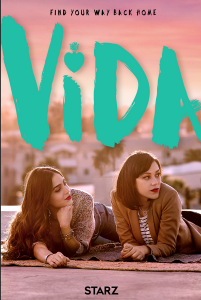VIDA is Starz’s new Sunday-night series set in East Los Angeles. Twentysomething sisters Lyn (Melissa Barrera) and Emma (Mishel
Prada) come home upon hearing news of death of their mother Vidalia – Vida for short. Lyn and Emma don’t get along with each other, and Emma was barely on speaking terms with Vida. It comes as a big shock to both young women that Vida left behind a spouse they didn’t know about, and more, that widow Eddy (Ser Anzoategui) is a woman. All three of them have inherited Vida’s neighborhood bar, which has over the past few years become a Latinx lesbian hangout.
VIDA is series creator Tanya Saracho’s first experience running a television series. She has written for other shows and has had plays produced all over the U.S. and Mexico (Saracho is originally from Sinaloa), but she is so overjoyed by VIDA’s existence, she acknowledges she can barely contain herself.
“You don’t get a lot of shots at this, sitting on this stage,” Saracho says, addressing a group of journalists. “You can look at the [television] landscape. There are, like, four Latinx gay shows right now out of five hundred and twenty. We [Latinx people] make up almost twenty percent of this country, but that’s not even one percent. We all felt the pressure, in a good way, to [do it right]. I am not graceful when you see my geekiness right now, because I am excited. We don’t get to do this, and I’m so excited to share this world with you guys. I was never graceful about it. The fact that Starz came to me, they’re the ones that proposed this world of ‘gentrification’ [pronounced “hentrification,” indicating the Latinx influence] and ‘chipsters,’ Chicano hipsters, and I was like, ‘Yes, I can write you something.’ And that was exciting, that they trusted me with a pen in that regard, and then the fact that we got to build it right. My casting director is a Latinx, Carmen Cuba, [who] got it. The conversations were the right conversations to have to reach into these communities for casting the right way. My cinematographer [Carmen Cabana] is Latinx. At every step of the way, I got really excited.”
In a one-on-one interview later that day, Saracho talks more about VIDA.
ASSIGNMENT X: VIDA seems like such an organic piece. At the start, how did you approach it – “Okay, this is the universe I want to tell a story about, so what’s my way into it?”
TANYA SARACHO: Well, they [Starz] pitched me the theme, the “hentrifictation” and “Chipsters” – Chicano hipsters, and gentrification by Latinx of another Latinx space. They introduced the notion to me, I was like, “Oh, we’re really doing this.” Because you can’t – I mean, you can, but I can’t write a show about themes. I have to write a show about people. And so I started with the sisters, and then built the world from there. So as long as I keep coming back, and I still do, to the sisters, I think we won’t go wrong, because they are the embodiment of those themes, right? They went away, did their thing, one of them became really successful, the other one is doing well, but by the wrong means, and they’re coming back home. They have a building, and a bar, and it’s what are they going to do with it? So the theme is in action with them. So as long as I can bring it back to the characters and the sisters …
AX: At the start, were you thinking, “Aha, I shall create VIDA and I shall be the show runner,” or was it like, “I’m creating it and, oh, my God, I’m also the show runner, what do I do now?!”?
SARACHO: [laughs] More like that. I’m still right now, “Oh, God, I’m the show runner.” Starz was really amazing in putting their faith in me, because I’d never done it. I’m a baby show runner, and I’d only been in this industry for three years, a very baby TV writer in lots of ways. I’ve been doing theatre, writing plays, for almost twenty years, but this was really new, and they took a chance on me, and I hope it’s paying off, knock wood.
AX: In casting, were there people you knew you wanted, or did you just cast a very wide net, or anybody you’d worked with in theatre …?
SARACHO: A genius, Carmen Cuba, is my casting director, who is a goddess, whom I love, who is Latina, and who cast STRANGER THINGS, and SENSE8, and LOOKING. So she knows how to reach into these communities and cast really authentically, so that it feels really real. I had seen Ser in a play and I was watching the play, and I couldn’t concentrate on the play, I was like, “That’s Eddy, that’s Eddy.” It was early days of the pilot, I had just written it, I didn’t know if I was going to get to do it, but I just kept her [in mind]. So when the time came, it was always Ser. And then Carmen has a way of just reaching into the communities and just pulling out beautifully authentic choices.
AX: Now, the more successful sister, Emma, is LGBTQ, correct?
SARACHO: Yeah, she’s queer, correct.
AX: And the younger sister, Lyn, is heterosexual …
SARACHO: She’s a little fluid sometimes, but she’s straight.
AX: It’s interesting to see a story where the one main heterosexual character seems to have a more problematic romantic relationship than anybody else …
SARACHO: Hopefully, you’ll see that it’s a complicated relationship, that she comes back home, and ends up having in front of us, in this season. So you’ll see it at play, you’ll see her hetero-normative aesthetic at play. But more than anything, she’s lost. She hasn’t figured out how to contribute in the world, and how to be in the world, as who she really is. She needs another person to tell her, “So we’re sporty? Okay, so we’re the sporty couple,” “Now we’re the hipster couple.” So she doesn’t know herself. So by coming home, I think, hopefully, in the seasons to come, she’s going to get to know herself. Because this neighborhood doesn’t let you be anything but yourself.
AX: Is the bar based on a particular bar in East L.A.?
SARACHO: Mm. There was Rent, it was a lesbian bar, which had a little bit of influence, but no. I just sort of built the story on the characters, so it’s not based on a bar, it’s just based on the sisters, and the mother, when she started dating Eddy, Eddy’s friends started coming to the bar, and then just accidentally it became a [lesbian] bar, and then the old guard, all the older men, started leaving the bar, and so it’s become a safe haven, but not by design. Vidalia, the girls’ mother, started first dating, and then marrying, and then it just became the unspoken [lesbian] bar of the neighborhood.
AX: How aware were the sisters of their mother being lesbian, and how aware was the mother of Emma?
SARACHO: The queer daughter is very estranged from her mother. They don’t speak. There’s a whole thing that hopefully you’ll find out in the first season. And then Lyn comes back home when she needs money [laughs], or needs a place to stay when she’s between people she’s dating – and she’s aware that her mom has a roommate, but doesn’t get into it. Both of them are kind of sideswiped. But I do want to stress about Vidalia, their mother, having a wife. I think the biggest betrayal for them is that their mother married someone at all – who cares, male, female, whatever – she started a family without them. That how estranged everybody is. And then that it was a woman – at least tell them. Because Emma is queer. I think it’s, “What?!” That’s where we begin the story. Those two betrayals. And then there’s no mother to be like, “Mother!” Because she’s dead.
AX: Is the father anywhere in the picture?
SARACHO: We’ll find out later.
AX: What does having the two different sisters, who are both initially estranged from this place, bring you?
SARACHO: It brings different points of views. Also, to be broad, one is really hard on the outside, but I’m excited to get to the soft center. The other one is the opposite. You think she’s a love, but there’s a hard darkness in there. And I’m excited to play with those two energies. They give you a lot when it comes to story. And it feels really real.
AX: And then there’s Eddy …
SARACHO: Eddy is a love. Yeah, Eddy is the heart of the story. Eddy is this neighborhood. Eddy holds a torch in a way that the sisters maybe not so much hold the torch for Vidalia. I hope you guys fall in love with Eddy. I love her.
AX: Did Eddy know about the sisters’ existence?
SARACHO: Yeah.
AX: Is she more, “Oh, I’m so glad to meet you, you’re Vidalia’s daughters,” or, “Where the hell have you two people been?”
SARACHO: She was a willing participant in that closeted decision, to not say. I think she was hoping that eventually they would include them as a family, but she was taking Vidalia’s lead on that.
AX: Are there any other series that you can say, “Well, the tone of VIDA is sort of like this,” or “It’s sort of like that”?
SARACHO: I would say it’s a mixture of ATLANTA and GIRLS and LOOKING, all put really Latinx.
AX: The characters in VIDA often switch between English and Spanish. Was there much consideration given to what language people would be speaking at what time?
SARACHO: No, because it’s reflecting how we speak. Right now, there’s a term called “pocho,” or “pocha,” which is like “Spanglish.” It’s “of two tongues.” If you hang out on our set, or hang out with our actors, we switch back and forth, code switch. And the show is like that, it reflects that. It totally code switches on itself all the time.
AX: As a show runner, what was the most challenging thing to be able to do? To be able to share the writing, or to go, “Oh, my God, do we have enough money in the budget for this scene,” or …?
SARACHO: Starz has been amazing, so I’ve got very few complaints there, but it’s me. Am I living up to this? Am I doing justice to the story? And not just that. People say, “Don’t feel the pressure of your community,” but I do. Because we don’t get this shot a lot. And like the HAMILTON song says [laughs], I’m not throwing away my shot. I’m trying to do this right. And sometimes it feels like I’m not doing it right. It’s more like a personal engine. But all of it is difficult, it’s really hard [laughs].
AX: Has anything come out of the writers’ room that’s surprised you?
SARACHO: I’m sure it has. I can’t think of it right now. I have the best writers. Every time I get a script, there’s something surprising and amazing in it, and it ends up on the screen, but I can’t think of it right now.
AX: Are you shooting more on soundstages, or more on the streets?
SARACHO: We divide, so we have some sets on soundstages, but we’re in the street a lot, and that’s really exciting.
AX: How are the neighborhoods where you’re shooting responding to the VIDA production?
SARACHO: I think pretty well. We try to be really respectful – get in and get out. Some sets, like their apartment, are on the soundstage. But we combine. [VIDA is a] love letter to the Eastside. You have to do that stuff outside, you have to see it. But we try to be really respectful. Because sometimes communities haven’t seen production, so you want to be the best guests that you can be.
AX: Is it also like, “Oh, good, you’re not another cop show”?
SARACHO: I know, right [laughs]. We’re not another cop show, we’re not a drug show, we’re not a maid show. We are VIDA.
AX: Have you had any favorite moments of production so far?
SARACHO: I love, love, love our crew, but I think this is the most Latinx crafty [craft service catering], because every day is something like, “Today is pupusa, today is churros, today is tamales.” And I’ve gained like I don’t know how much, because it was so delicious, but it was all Latinx-themed, and it was the most delicious set I’ve ever been on. You know how you feed your family? It felt like that, you feed your family.
AX: What would you most like people to know about VIDA?
SARACHO: That it is necessary, a show like this, something this complicated, something this nuanced, because we don’t get a lot of depictions – we get a lot of [Latinx] archetypes, but we don’t get a lot of front and center exposition in the media, and I would like them to get to know these characters, these people that reflect real life.
This interview was conducted during Starz’s portion of the Television Critics Association (TCA) press tour.
Follow us on Twitter at ASSIGNMENT X
Like us on Facebook at ASSIGNMENT X
Article Source: Assignment X
Article: VIDA: Exclusive interview with creator on Season 1 of new Starz comedy
Related Posts:













